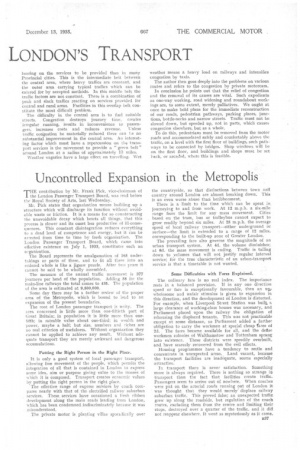Uncontrolled Expansion in the Metropolis
Page 55

If you've noticed an error in this article please click here to report it so we can fix it.
THE contribution by Mr. Frank Pick, vice-chairmah of the London Passenger Transport Board, was read before the Royal Society of Arts, last Wednesday,
Mr. Pick states that organization means building up a structure which will discharge its function without avoid able waste or friction. It is a means for so counteracting the unavoidable decay which besets all things, that this process is slower and its onset less productive of ill-conse quences. This constant disintegration reduces everything to a dead level of competence and energy, but it can be arrested from time to time by fresh organization. The London Passenger Transport Board, which came into effective existence on July 1, 1933, constitutes such an oaganization.
The Board represents the amalgamation of 165 undertakings or parts of these, and to fit all these into an ordered .whole is like a jigsaw puzzle. After two years it cannot be said to be wholly assembled.
The measure of the annual traffic movement is 377 journeys per head of the population. Adding 58 for the main-line railways the total comes to 435. The population of the area is estimated at 9,500,000.
Some day there may be a further review of the proper . area of the Metropolis, which is bound to lead to an expansion of the present boundaries.
The root of London passenger transport is unity. The area concerned is little more than one-fiftieth part of Great Britain; in population it is little more than one fifth; in rateable value about one-third; in wealth and power, maybe a half; .but size, numbers and riches are no real criterion of usefulness. Without organization they cannot be applied to achieve any result, Without adequate transport they are merely awkward and dangerous accumulations.
Putting the Right Person in the Right Place.
It is only a good system of local passenger transport, allowing free movement of the people, which permits the integration of all that is contained in London to express some idea, aim or purpose giving value to the masses of which it is Composed. Transport creates economic values by putting the right person in the right place.
The effective range of express services by coach compares nearly with that of. theelectrified railway suburban services. These services have occasioned a fresh ribbon development along the main roads leading from London, which has been condemned indiscriminately because it was misunderstood.
The private motor is planting villas sporadically over the countryside, so that distinctions between town and country around London are almost breaking down. This is an even worse abuse thari beribbonment.
There is a limit to the time which can be spent in journeying to and from work. At 12 m.p.h. a six-mile range fixes the limit for any mass movement. Cities based on the tram, bus or trolleybus cannot expect to grow readily beyond six miles. At 25 m.p.h. the average speed of local railway transport—either underground or surface—the limit is extended to a range of 12 miles, corresponding to the built-up zone of Greater London.
The prevailing fare also governs the magnitude of an urban transport system. At 4d. the volume diminishes; at 6d. the mass movement is ending. Traffic is tailing down to volumes that will not justify regular interval service; for the true characteristic of an urban-transport service is that a timetable is not wanted.
Some Difficulties with Fares Explained.
The ordinary fare is no real index. The importance rests in a balanced provision. If in any one direction speed or fare is exceptionally favourable, then an up, wholesome and unfair stimulus is given to eXpansion in this direction, and the development of London is distorted. For example, when Liverpool Street Station was built, a large clearance of working-class houses was necessary, and Parliament placed upon the railway the obligation of rehousing the displaced tenants. This was not practicable except at some distance, so Parliament added a further obligation to carry the workmen at special cheap fares of 2d. The fares became available for all, and the defise workmen colonies of Walthamstow and Tottenham sprang into existence. These districts were speedily overbuilt, and have scarcely recovered from the evil effects.
Housing programmes have a tendency to settle and concentrate in unexpected areas. Land vacant, because the transport facilities are inadequate, seems especially attractive.
In transport there is never satisfaction. Something more is always required. There is nothing so strange in transport than the fact that facilities create traffic. Passengers seem to arrive out of nowhere. When coaches were put on the arterial roads running out of London it was thought that they would merelydisplace railway suburban traffic. This proved false; an unexpected traffic grew up along the roadside, but regulation of the coach routes, excluding them from the centre and limiting their stops, destroyed over a quarter of the traffic, and it did not reappear elsewhere. It went as mysteriously as it came.




































































































